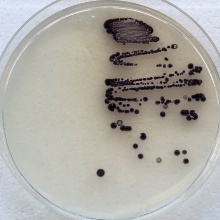Multi-resistant germs can cause severe infections, particularly in people with a weakened immune system, and are difficult to treat with conventional antibiotics. Novel active substances with anti-infective and sometimes antibiotic effects such as violacein are promising candidates for a remedy, but it has so far been difficult to produce them in sufficient quantities. The DFG priority program “InterZell” (SPP 2170), in which renowned research institutions throughout Germany are working together, wants to raise the visibility of new innovations. As part of “InterZell”, scientists from the University of Stuttgart are working on a novel, mixed-culture process to increase the production of violacein.
The conventional production of antibiotics today mostly takes place in bioreactors based on monocultures. In nature, on the other hand, antibiotics serve as compounds that prevent the growth of competitors for the same substrate, so several strains are involved. Conventional production in monocultures, therefore, corresponds to stress conditions that are not beneficial to the growth of the producer strains. For example, knowing how the microscopic cells interact with the bioreactor and with each other is essential for a successful production of proteins or biopharmaceuticals such as antibiotics, insulin, and vaccines. This is where the research of “InterZell” comes in, as it is known that 95 percent of the microbial flora can be better cultivated in mixed cultures, and can be optimized and modeled by a tailor-made scale-up from the laboratory to industrial production.
New approaches for the mixed-culture production of active substances
Against this background, a team headed by Prof. Ralf Takors from the Institute for Biochemical Engineering and Prof. Georg Sprenger from the Institute of Microbiology (IMB) at the University of Stuttgart is researching new approaches for the mixed-culture production of active substances as part of the project “MiMiCry” (Using nature as a model: Continuous production of anti-infectives in synthetic mixed cultures). The project not only aims to imitate the basic physiological characteristics of active substances in the original environment, but also to use the synthetic implementation of novel properties in a consortium of two strains that can only grow and produce in symbiosis. Production will take place with the help of Escherichia coli bacteria, which grow much faster than the original producers and whose handling is well-known in microbiology. The approach is to start with the active substance violacein, which is a promising drug that is also used in tumor therapy and virology, as a flagship product and to ensure that it can be made available industrially in larger quantities and more effectively in the future.
DFG priority program with 50 researchers in ten projects
MiMiCry is one of two research projects at the University of Stuttgart that are funded by the German Research Foundation (DFG) within the framework of the priority program “InterZell” (SPP 2170). In the new priority program, a total of 50 scientists are conducting research on “Novel production processes and multi-scale analysis, modeling, and design of cell-cell and cell-bioreactor interactions (InterZell)” in ten projects at renowned scientific institutions in Germany. The particular focus is on the investigation of mixed cultures and consortia that can serve as successful producers of organic products. Mixed cultures are already being used industrially, for example, in yogurt production.
“The synergy of engineering and life science”
At the launch event for InterZell in the spring of 2020, Prof. Ralf Takors from the University of Stuttgart, who is the coordinator of this DFG priority program, highlighted the “synergy of engineering and life science” as a special feature of the new research program. The collaborations - a novelty in this area of research funding - are financed across disciplines as tandem projects.
Due to the increased online collaboration in times of corona, a common and uniform data management for all 21 research groups is not only innovative, but also of particular importance. For this purpose, the coordinator of the DFG program, Prof. Ralf Takors, and project manager Dr. Martina Rehnert are going to start a pilot project in cooperation with the data repository of the University of Stuttgart (DaRUS), which is located at the University Library.
Expert Contact:
Prof. Ralf Takors and Dr. Martina Rehnert, Coordination of the DFG Project “InterZell”, University of Stuttgart, Institute for Biochemical Engineering, phone: +49 711 685 69925, e-mail
InterZell in Social Media:
https://twitter.com/InterZell , https://www.instagram.com/interzell/


